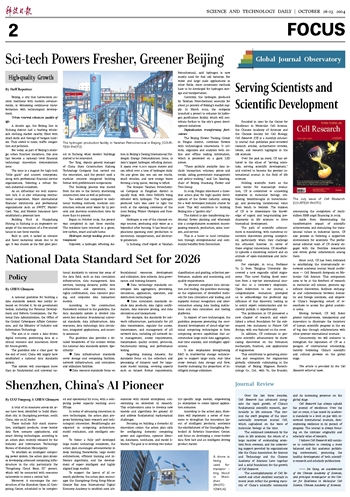
 |
| The hydrogen production facility in Yanshan Petrochemical in Beijing. (COURTESY PHOTO) |
Beijing, a city that harmonizes ancient traditions with modern advancements, is witnessing continuous transformation with technological development.
Urban renewal enhances quality of life
A decade ago, the Beijing Zoo in Xicheng district had a bustling wholesale clothing market nearby, filled with small stalls and throngs of bargain hunters. They added to noise, traffic congestion and pollution.
But today, as part of Beijing's strategic urban function transition, this area has become a national-level financial technology innovation demonstration zone.
The zone is a magnet for high-tech "little giant" and unicorn enterprises, along with professional financial service organizations, fostering a robust fin-tech industrial ecosystem.
As an influential sci-tech innovation hub, it is also enhancing international cooperation. Major international financial institutions and professional organizations such as SWIFT, MasterCard, Visa, and Modern Insurance have established a presence here.
Building No.8 at Huapichang Hutong in Xicheng is an impressive example of the renovation of a five-storied house in just three months.
Built in 1978, it lacked an elevator and faced numerous issues due to its age. It was chosen as the first pilot project in Xicheng when derelict buildings started to be renovated.
Tao Yang, deputy general manager of China State Construction Hailong Technology Company that carried out the renovation, said the project used a modular concrete integrated building format with prefabricated components.
The building process was moved from the site to the factory, shortening construction time as well as pollution.
Tao added that compared to traditional building methods, modular construction reduces solid waste by 75 percent and shortens construction time by more than 60 percent.
Begun in October 2023, the project was completed in just three months. The residents have returned to a green, low-carbon, smart and safe home.
Hydrogen energy leading green development
Hypower, a hydrogen refueling station in Beijing's Daxing International Hydrogen Energy Demonstration Zone, is Asia's largest hydrogen refueling station. It spans over 6,000 square meters and can refuel over 4 tons of hydrogen daily. On any given day, you can see trucks, small vehicles, and new energy buses forming a long queue, waiting to refuel.
The Sinopec Yanshan Petrochemical Company in Fangshan district is equally busy, with three forklifts being refueled with hydrogen. The hydrogen produced here was used to light the torch at the opening ceremony of the 2022 Beijing Winter Olympics and Paralympics.
Hydrogen is one of the cleanest energy sources, producing only water as a byproduct after burning. It has broad applications spanning steel production to electronics, transportation, and electricity generation.
Li Junliang, chief expert at Yanshan Petrochemical, said hydrogen is now mostly used for fuel cell batteries. For wider and large-scale applications in other fields, more convenient methods have to be developed for hydrogen storage and transportation.
Currently, the hydrogen produced by Yanshan Petrochemical accounts for about 50 percent of Beijing's market supply. In March 2024, the company launched a project to enhance its hydrogen purification facility, which will contribute further to the city's green development initiatives.
Digitalization transforming floriculture
The Beijing Flower Trading Center in Fengtai district, combines flowers with technological innovations. It collects, organizes and analyzes both online and offline trading information, which is presented on a giant LED screen.
"These publicly available data include transaction volumes, prices and trends, aiding government management and policy-making," said Lin Qiaoling, chair of Beijing Huaxiang Flower and Tree Group.
In 2023, Fengtai introduced a three-year action plan for high-quality development of the flower industry, aiming for a well-developed industry cluster by 2026. This will contribute to building Beijing into a "garden city."
The district is also transforming traditional flower planting and wholesale into a comprehensive ecosystem encompassing research, production, sales, tourism, and service.
This is a boost to rural revitalization through entrepreneurial and community benefits from floriculture.


 Next
Next




